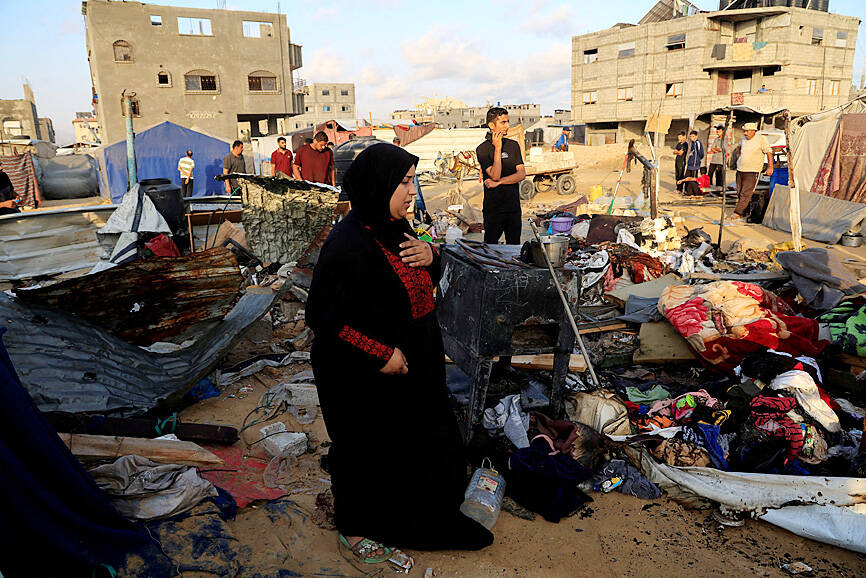Hamas yesterday suggested that it was open to a ceasefire agreement with Israel, but stopped short of accepting a US-backed proposal announced by US President Donald Trump hours earlier, insisting on its longstanding position that any deal bring an end to the war in Gaza.
Trump on Tuesday said that Israel had agreed on terms for a 60-day ceasefire in Gaza and urged Hamas to accept the deal before conditions worsen.
The US leader has been increasing pressure on the Israeli government and Hamas to broker a ceasefire and hostage agreement, and bring about an end to the war.

Photo: Reuters
Trump said the 60-day period would be used to work toward ending the war — something Israel said it would not accept until Hamas is defeated.
He said that a deal might come together as soon as next week.
However, Hamas’ response, which emphasized its demand that the war end, raised questions about whether the latest offer could materialize into an actual pause in fighting.
Hamas official Taher al-Nunu said that the militant group was “ready and serious regarding reaching an agreement.”
Hamas was “ready to accept any initiative that clearly leads to the complete end to the war,” he said.
A Hamas delegation was expected to meet with Egyptian and Qatari mediators in Cairo yesterday to discuss the proposal, said an Egyptian official, speaking on condition of anonymity.
Throughout the nearly 21-month-long war, ceasefire talks between Israel and Hamas have repeatedly faltered over whether the war should end as part of any deal.
Hamas has said that it is willing to free the remaining 50 hostages, fewer than half of whom are said to be alive, in exchange for a complete Israeli withdrawal from Gaza and an end to the war.
Israel said it would only agree to end the war if Hamas surrenders, disarms and exiles itself, something the group refuses to do.
An Israeli official said that the latest proposal calls for a 60-day deal that would include a partial Israeli withdrawal from Gaza and a surge in humanitarian aid to the territory.
The mediators and the US would provide assurances about talks on an end to the war, but Israel is not committing to that as part of the latest proposal, the official said.
It was not clear how many hostages would be freed as part of the agreement, but previous proposals have called for the release of about 10.
Israel has yet to publicly comment on Trump’s announcement.
Meanwhile, Gaza’s civil defense agency said that Israeli strikes killed at least 41 people yesterday.
Additional reporting by AFP

DEADLOCK: Putin has vowed to continue fighting unless Ukraine cedes more land, while talks have been paused with no immediate results expected, the Kremlin said Russia on Friday said that peace talks with Kyiv were on “pause” as Ukrainian President Volodymyr Zelenskiy warned that Russian President Vladimir Putin still wanted to capture the whole of Ukraine. Meanwhile, US President Donald Trump said that he was running out of patience with Putin, and the NATO alliance said it would bolster its eastern front after Russian drones were shot down in Polish airspace this week. The latest blow to faltering diplomacy came as Russia’s army staged major military drills with its key ally Belarus. Despite Trump forcing the warring sides to hold direct talks and hosting Putin in Alaska, there

North Korea has executed people for watching or distributing foreign television shows, including popular South Korean dramas, as part of an intensifying crackdown on personal freedoms, a UN human rights report said on Friday. Surveillance has grown more pervasive since 2014 with the help of new technologies, while punishments have become harsher — including the introduction of the death penalty for offences such as sharing foreign TV dramas, the report said. The curbs make North Korea the most restrictive country in the world, said the 14-page UN report, which was based on interviews with more than 300 witnesses and victims who had

COMFORT WOMEN CLASH: Japan has strongly rejected South Korean court rulings ordering the government to provide reparations to Korean victims of sexual slavery The Japanese government yesterday defended its stance on wartime sexual slavery and described South Korean court rulings ordering Japanese compensation as violations of international law, after UN investigators criticized Tokyo for failing to ensure truth-finding and reparations for the victims. In its own response to UN human rights rapporteurs, South Korea called on Japan to “squarely face up to our painful history” and cited how Tokyo’s refusal to comply with court orders have denied the victims payment. The statements underscored how the two Asian US allies still hold key differences on the issue, even as they pause their on-and-off disputes over historical

CONSOLIDATION: The Indonesian president has used the moment to replace figures from former president Jokowi’s tenure with loyal allies In removing Indonesia’s finance minister and U-turning on protester demands, the leader of Southeast Asia’s biggest economy is scrambling to restore public trust while seizing a chance to install loyalists after deadly riots last month, experts say. Demonstrations that were sparked by low wages, unemployment and anger over lawmakers’ lavish perks grew after footage spread of a paramilitary police vehicle running over a delivery motorcycle driver. The ensuing riots, which rights groups say left at least 10 dead and hundreds detained, were the biggest of Indonesian President Prabowo Subianto’s term, and the ex-general is now calling on the public to restore their